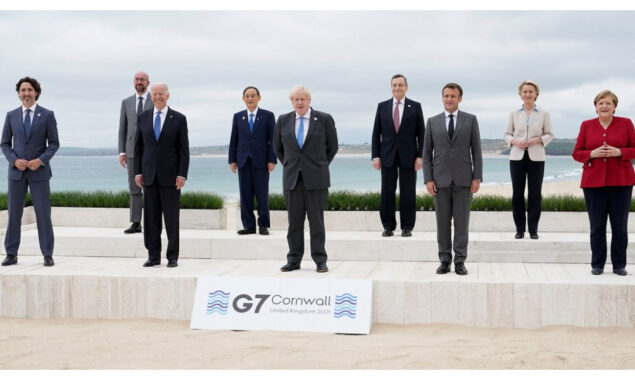
The working session at the G7 foreign ministers’ summit in Weissenhaeu is attended by German Foreign Minister Annalena Baerbock, French Foreign Minister Jean-Yves Le Drian, British Foreign Secretary Elizabeth Truss, Canadian Foreign Minister Melanie Joly, European Union’s High Representative for Foreign Affairs Josep Borrell, US Under Secretary of State for Political Affairs Victoria Nuland, Italian Foreign Minister Luigi Di Maio, and Japanese Foreign Minister Yoshimasa Hayashi. Pool/Kay Nietfeld
WEISSENHAUS, DEUTSCHLAND 14 May (Reuters) – The Group of Seven foreign ministers agreed on Saturday to further isolate Russia economically and politically, to continue supplying weaponry to Ukraine, and to combat what Germany’s foreign minister called as Moscow’s “wheat war.”
Senior diplomats from the United Kingdom, Canada, Germany, France, Italy, Japan, the United States, and the European Union met at a 400-year-old castle estate in the Baltic Sea resort of Weissenhaus and committed to provide military and defence aid for “as long as necessary.”
According to a joint statement, they would also combat what they called Russian propaganda aimed at blaming the West for food supply concerns throughout the world caused by economic sanctions on Moscow, and they encouraged China not to support Moscow or justify Russia’s war.
“Have we done enough to mitigate the consequences of this war? It is not our war. It’s a war by the president of Russia, but we have global responsibility,” Germany’s Foreign Minister Annalena Baerbock told reporters at a closing news conference.
The key to increasing pressure on Russia is to prohibit or phase out the purchase of Russian oil, with EU member states expecting to reach an agreement on the matter next week, even if Hungary remains opposed at this time.
“We will expedite our efforts to reduce and end reliance on Russian energy supplies and as quickly as possible, building on g7 commitments to phase out or ban imports of Russian coal and oil,” the statement said.
The ministers stated that additional sanctions would be imposed on Russian elites, including economic actors, central government institutions, and the military, allowing President Vladimir Putin to “lead his war of choice.”
The summit in northern Germany, attended by Ukraine and Moldova’s foreign ministers, also highlighted food security problems and fears that Ukraine’s war could spill over into its smaller neighbour Moldova.
“People will be dying in Africa and the Middle East and we are faced with an urgent question: how can people be fed around the world? People are asking themselves what will happen if we don’t have the grain we need that we used to get from Russia and Ukraine,” Baerbock said.
For the latest International News Follow BOL News on Google News. Read more on Latest International News on oldsite.bolnews.com
Read More News On
Catch all the International News, Breaking News Event and Latest News Updates on The BOL News
Download The BOL News App to get the Daily News Update & Follow us on Google News.




